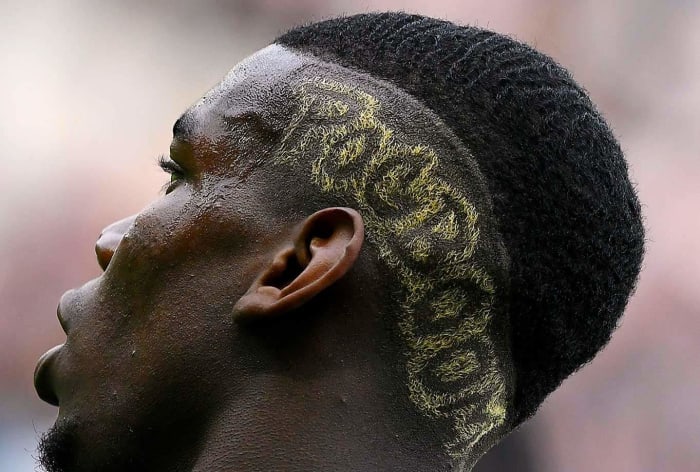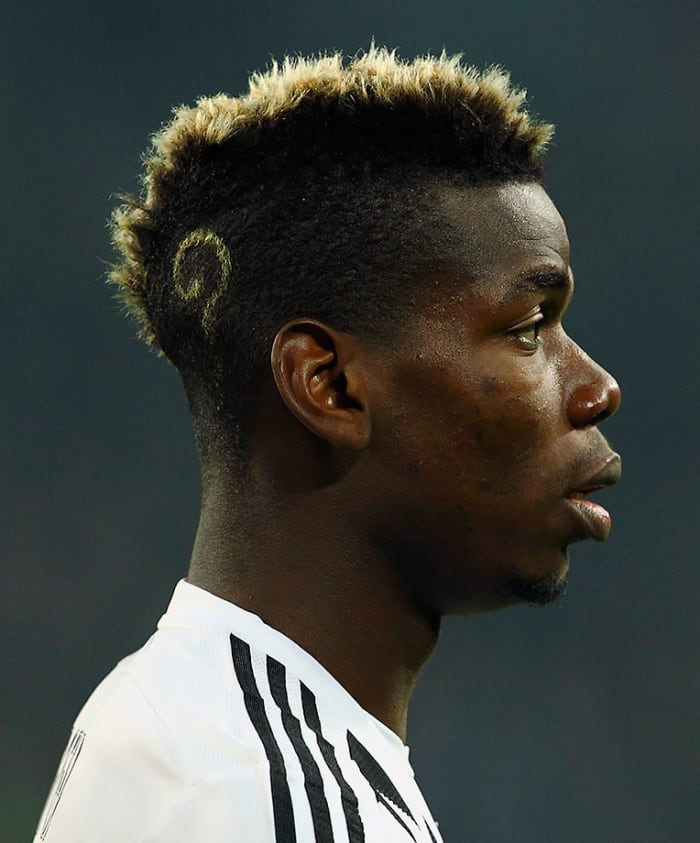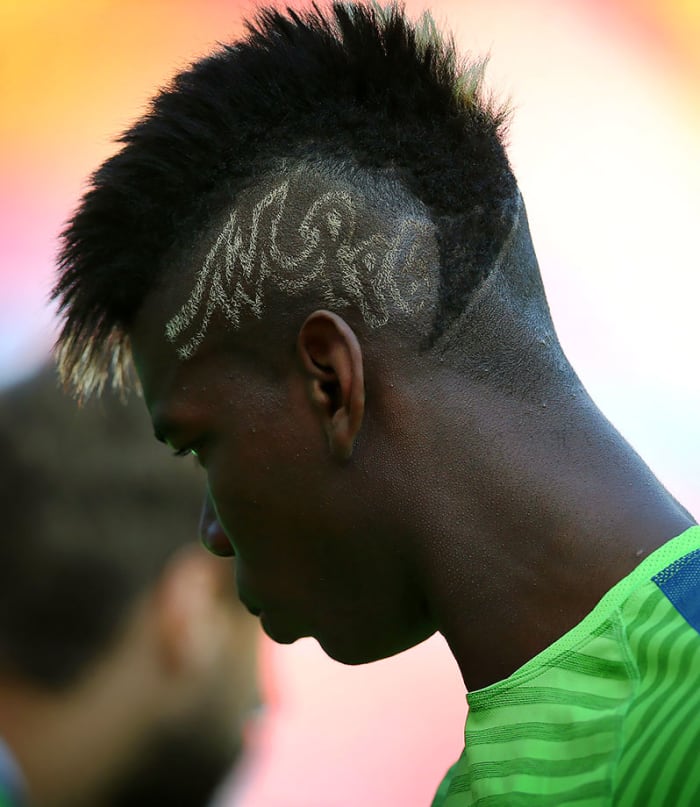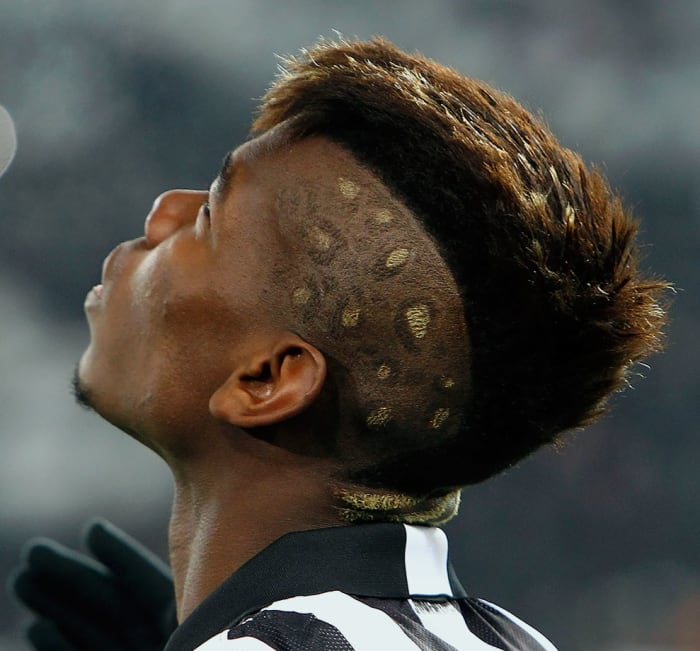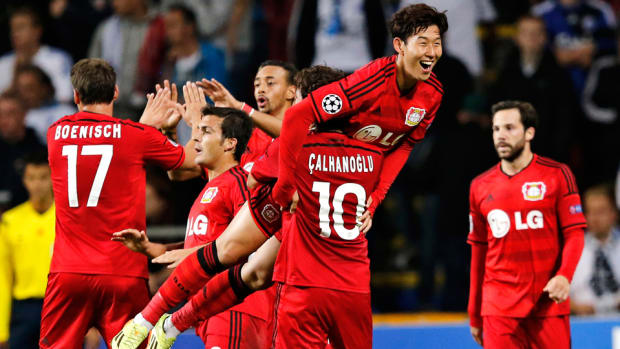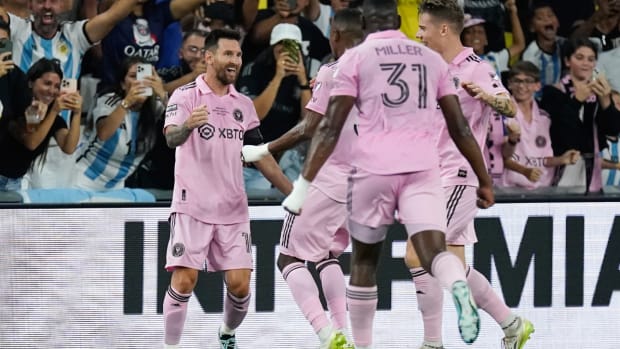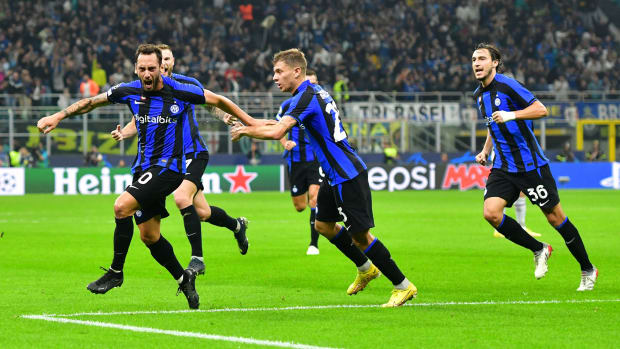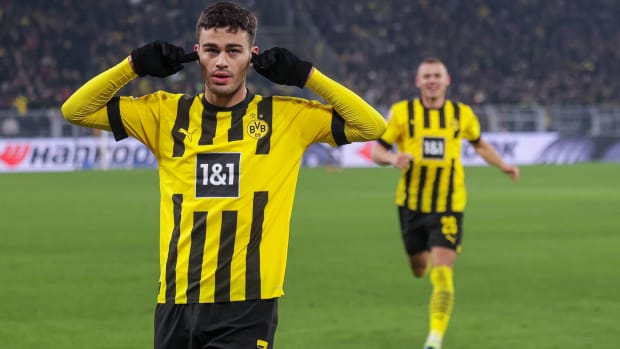Politics, culture, identity make Les Bleus' place in France complicated
France’s legend-in-the-making Raymond Kopa, né Kopaszewski, was insulted. It was November 15, 1952, the day before France’s first soccer match on Irish soil, and a flyer circulated around Dublin that proclaimed him not French enough to represent his country.
“The French team you’re going to see is not the real team of France, but a formation of naturalized peoples and foreigners who consist of Poles, Hungarians, or Italians like Ruminski, Giaessi, Ujlaki, Kopa, Ferry, Curyl, Piantoni,” the note warned. “Do not hesitate to whistle at them. They aren’t the real French soccer players that our players will face. Whistle at them!”
Kopa was so incensed, he included this defamatory flyer in his 1958 memoirs, Mes Matches et Ma Vie (My Matches and My Life). “The agitators,” he wrote, “had found an excellent pretext.” But they were also wrong. Only one member of the squad, Joseph Ujlaki, was a naturalized Frenchman. Everyone else was born in France and had, like Kopa, opted for French nationality at age 21.
- EURO 2016: Live gamecasts, scores, schedules, tournament history
“The Irish spectators, already particularly chauvinistic and easily excitable, for the most part ignored that France is a country of immigration,” Kopa recalled. The 1-1 draw was one of the rudest games he experienced. Despite the name inherited from his Polish-born parents, the soccer great had not previously encountered such ostracism. He was proud to be called the more French-sounding “Kopa” by his fellow citizens. “I had only one country,” he wrote, “France.”
Euro 2016 Power Rankings: Final 16 teams in France
More than 60 years later, members of the French team, Les Bleus, are still “fiers d’être Bleu,” proud to be Blue, this summer’s slogan. People still talk about what it means to be French within the context of soccer and the national team, albeit this time it stems from the French themselves, not outsiders. The discourse is a mixture of pride and critique, for France has a complicated relationship with the sport.
France was an early adapter of the game, learned from the British. Initially a sport of the French upper classes, soccer spread and trickled down to the working classes after the First World War. Its emphasis on democracy, team play, and meritocracy, helped foster a sense of community in certain areas, particularly the Nord-Pas-de-Calais mining centers of Kopa’s childhood. Ever since, it has helped assimilate generations of immigrants throughout the country.
PODCAST: Chelsea's Begovic breaks down Euro group, knockout stages
There is also a strong tradition of French leadership crafting the modern game. Without Jules Rimet (World Cup, 1930), Gabriel Hanot and Jacques Ferran (Champions League, 1955), or Henri Delaunay (European Championship, 1960), international soccer competitions would look quite different.
While the French have long engaged in all forms of athletic activity, sport, particularly soccer, was not considered a cultural endeavor. In fact, the first French sports crisis of the 1960s and 1970s, the failure of many athletes to obtain medals and titles at major international competitions, was partially blamed on the absence of a national sports culture. One was inscribed into the social fabric by the 1975 Mazeaud Law and French attitude toward sports, including soccer, began to transform.
Best of the Euro 2016 group stage: Sweatpants, late winners and more
The 1998 World Cup win was a major turning point. Historian Marion Fontaine, who specializes in the soccer culture of Kopa’s Nord-Pas-de-Calais, found that while people previously liked the sport, “the passion [for the game] was born” during the tournament.
Combined with the 2000 Euro title, the national team was mythicized, the game heavily mediatized, and soccer entered a new era.
Joachim Barbier, a journalist for soccer magazine SoFoot and author of Ce Pays Qui N’Aime Pas le Foot (This Country that Doesn’t Like Soccer), agreed. After 1998, he said, “it was a bit more fancy to say that you love soccer.” For Barbier, a front-row observer, “the change was about how to use soccer to talk about something else.”
Today, soccer is the king of sports. France has the third largest number of registered soccer players in Europe, according to UEFA. It is the country’s most heavily consumed sport, one people have become passionate about.
Soccer is also one of the most democratic milieus in France. Talented players can excel, regardless of their socio-economic status, skin color, or family name. Those selected for the national team thus represent the country’s diverse immigrant and colonial legacies. Since the 1930s, France has fielded one of the most ethnically diverse teams of any European country. Even today, Fontaine noted, “the French team is much more racially unique” than any of its Continental counterparts.
But soccer has also become France’s most heavily critiqued and criticized sport, caught in the crosshairs of the country’s second sports crisis: what it means to be French. It’s a complicated cultural conversation, but one that stems in part from the great republican democratizer, education—or the perceived lack thereof.
Pogba's gesture turns into media censorship matter, adds pressure
France is unlike the United States, where sport and academics are closely intertwined in the schools and university systems. Instead, one must choose between finishing high school or pursing sport to its highest levels. Many aspiring soccer players—though certainly not all—cease their schooling at early ages to follow their passion.
This leaves them woefully ill-equipped for life in the spotlight.
“I am not sure that the youth academies give [the young players] the keys to manage their image,” Fontaine said. “I think that it is a real problem of forming French soccer players.”
Pierre Mbas, Director of Partnerships and Programs of Diambars, a youth academy dedicated to forming fully rounded athletes, intimately knows the young men who dream about playing pro. “Most of those kids think that to achieve you must earn a lot of money and buy big cars, expensive watches,” he said.
This feeds into the negative connotations surrounding the sport’s bling-bling culture, one that rankles in some corners of a country with strong socialist sentiments.
“They make a lot of mistakes,” Mbas observed of today’s young players who post Instagram photos and Tweets of their flashy, newly acquired consumer goods. “They just do not understand the world they live in.”
“French people really think that you cannot be both a good player and somebody well educated,” Mbas said, citing the French expression, ‘tout dans les jambes, rein dans la tête (all in the legs, nothing in the head).’ “The perception of football is negative, because media and politics present it like something for simple-minded people.”
GALLERY: Paul Pogba's many hair designs
Paul Pogba's Many Haircuts
It was not always this way. Just ask former Paris Saint-Germain midfielder Edouard Cissé.
Born in 1978 to parents of Senegalese lineage, Cissé played soccer throughout his childhood in southwestern Pau. He also pursued the more popular regional sports of rugby and basketball. As a teenager he chose to specialize in soccer, but continued his academic studies in economics until he signed as a professional player with Pau Football Club at age 19.
“I believe it was my destiny to follow this trajectory,” Cissé explained of his decision. It was an era in which French players—and coaches—established the country as an excellent former of young soccer talent that supplied the elite leagues in Europe. Eric Cantona was a fixture at Manchester United, Marcel Desailly at AC Milan, Zinédine Zidane at Juventus, and Arsène Wenger and Patrick Viera began their long residencies at Arsenal. But they all did so before the harsh glare of the internet and the constant spotlight of social media was de rigeur.
It is a contrast Cissé draws to the younger generations aspiring to be professionals today.
“These youth players are under-educated,” he said. “A professional player practices football and only football all the time from age 13. By the time they arrive at [the professional level] age 19 or 20, they earn a good living and are projected into the public, but without a real training and backing.”
If it were just a question of reining in the image of players—of their hair styles, the flashy cars—that would be one thing. Cissé pointed out that most big soccer clubs could learn from the NBA, which has improved the public perception of its players in the last 10 years by imposing a dress code. But the public criticism of its soccer stars stems from deeper perceived slights.
Host France is Euro 2016's favorite, but Deschamps's defense has doubts
Cissé observed that the ‘racial generation’ of Franck Ribéry, Samir Nasri, and Karim Benzema, those who came from the banlieues, had difficulties with the French public from the beginning—but not necessarily because of their skin color.
“The public do not like them because they have not shown love in their attitude,” he said. “They did not respect as forcibly the precedent codes.”
Moreover, he said, there remains prejudice against the players who went on strike at the 2010 World Cup. This is ironic as soccer players previously did so during the Events of 1968, and labor demonstrations are part of the world’s stereotype of typical French actions.
But as Barbier has long observed, “any affair is seen as a national outrage because we consider that [the players] should be exemplary, because they represent the nation and because they are models for the kids.” The French want Les Bleus to win but to do so in a way that reflects national republican ideals. “It’s a huge task,” he said.
Thus the cultural conversation about soccer is also a political one.
For Amirouche Laïdi, “there is an identity problem in France.” President of Club Averroes, a group dedicated to promote diversity in French media, and member of sports think tank Sport & Démocratie (which the author also belongs to), Laïdi pointed out that the identity crisis is rooted in France’s larger political and socio-economic difficulties.
“The ambiance in France is not good,” he said of years of economic stagnation, high unemployment, and difficulties assimilating its minority populations. The sense of anxiety is enflamed by the rise of the far-right-wing Front National under Marine Le Pen, who knits perceived threats from immigration with last year’s deadly terrorist attacks into an ugly brew of vitriol.
Cristiano Ronaldo's roller-coaster Euro group stage ends with heroics
According to Laïdi, such anxieties are exported to the world of sport. “Politicians get mixed up in soccer’s affairs,” he said, attempts to capitalize on its popularity.
Euro 2016 falls at a complicated time for the host country, but is perhaps a needed breath of fresh air. Fontaine mused that people view the tournament as a way to help ease certain tensions, “that it can help to unify.” Moreover, she said, “there is an envy to win.”
A deep run into the tournament is not beyond the realm of possibility. Cissé, and many other soccer specialists, acknowledge that Les Bleus have a good chance.
“This generation is very beautiful,” he said, “more sane, more together, more united,” pulled together by coach Didier Deschamps, “who does not judge a player on anything but their level and their rapport with the group.”
Cissé’s prognosis? “Allez les Bleus!”
Lindsay Sarah Krasnoff is a historian and author of The Making of Les Bleus: Sport in France, 1958-2010. She can be followed on Twitter @lempika7.

